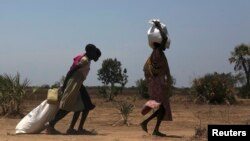GENEVA —
The United Nations warns millions of people in South Sudan are facing a potential famine because of a huge funding shortfall. A senior U.N. official says more than $230 million is needed in the next two months to avoid a humanitarian catastrophe.
About one million South Sudanese have been forced to flee their homes during the past 100 days. More than 800,000 are internally displaced within South Sudan. The rest are refugees in neighboring countries.
The U.N. humanitarian coordinator in South Sudan, Toby Lanzer, says this tragedy will likely be compounded by hundreds of thousands leaving the country this year.
He notes entire cities have been destroyed since the conflict between government and opposition forces erupted in mid-December. He says markets have collapsed, and trade has virtually stopped with Ethiopia, Uganda and Kenya. He says people are facing destitution.
“We have got 3.7 million people who are already at severe risk of starvation. And, we are in the month of April and May supposed to be celebrating the planting season," said Lanzer. "This is when it starts to rain and when people cultivate their fields. They tend to their cattle, their sheep and their goats. But, they cannot because it is unsafe. They cannot move to their fields with the sort of freedom that is required.”
Lanzer is telling international donors and government officials that millions of South Sudanese need help to survive. But he also says these people must be given the opportunity to help themselves.
He says money is needed now to make sure people have food in their stomachs so they have the energy to till the land.
He tells VOA it is critical that farmers be given the seeds and tools they need to start planting their crops today.
“If we were to miss the planting season, there will be a catastrophic decline in food security... because what will strike that country, and it will hit about seven million people will be more grave than anything that continent has seen since the mid-1980s," he said. "So, we are trying to prevent that. And, if that were to happen, it will cost people a whole lot more. So, invest now, or pay later.”
Lanzer says an immediate injection of $232 million would enable agencies to preposition relief supplies before the rainy season, which will render most of the country inaccessible by road.
About one million South Sudanese have been forced to flee their homes during the past 100 days. More than 800,000 are internally displaced within South Sudan. The rest are refugees in neighboring countries.
The U.N. humanitarian coordinator in South Sudan, Toby Lanzer, says this tragedy will likely be compounded by hundreds of thousands leaving the country this year.
He notes entire cities have been destroyed since the conflict between government and opposition forces erupted in mid-December. He says markets have collapsed, and trade has virtually stopped with Ethiopia, Uganda and Kenya. He says people are facing destitution.
“We have got 3.7 million people who are already at severe risk of starvation. And, we are in the month of April and May supposed to be celebrating the planting season," said Lanzer. "This is when it starts to rain and when people cultivate their fields. They tend to their cattle, their sheep and their goats. But, they cannot because it is unsafe. They cannot move to their fields with the sort of freedom that is required.”
Lanzer is telling international donors and government officials that millions of South Sudanese need help to survive. But he also says these people must be given the opportunity to help themselves.
He says money is needed now to make sure people have food in their stomachs so they have the energy to till the land.
He tells VOA it is critical that farmers be given the seeds and tools they need to start planting their crops today.
“If we were to miss the planting season, there will be a catastrophic decline in food security... because what will strike that country, and it will hit about seven million people will be more grave than anything that continent has seen since the mid-1980s," he said. "So, we are trying to prevent that. And, if that were to happen, it will cost people a whole lot more. So, invest now, or pay later.”
Lanzer says an immediate injection of $232 million would enable agencies to preposition relief supplies before the rainy season, which will render most of the country inaccessible by road.




